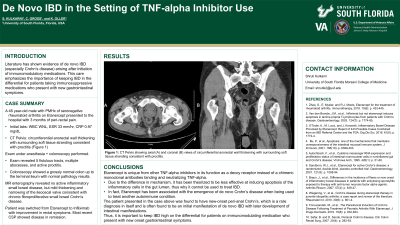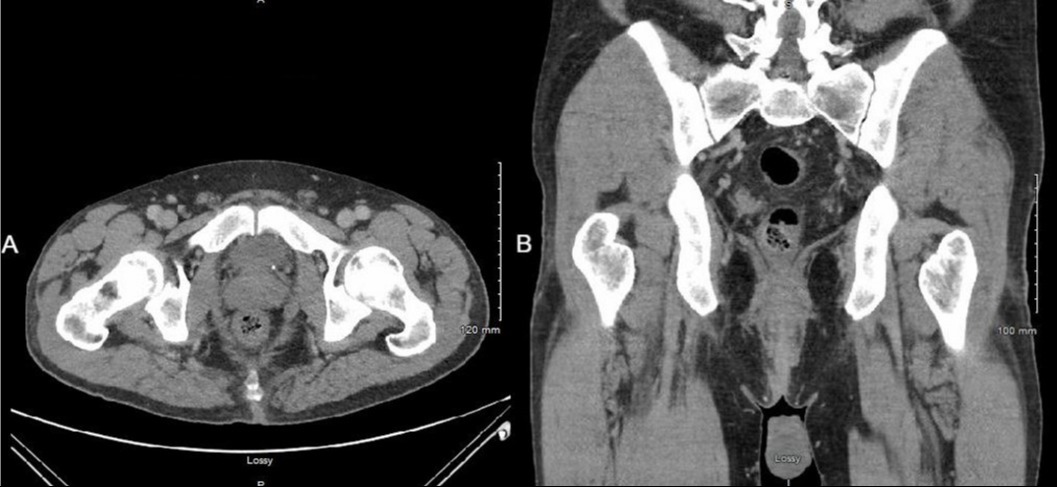Sunday Poster Session
Category: IBD
P0985 - De Novo Inflammatory Bowel Disease in the Setting of TNF-Alpha Inhibitor Use
Sunday, October 27, 2024
3:30 PM - 7:00 PM ET
Location: Exhibit Hall E

Has Audio

Shruti Kulkarni, MD
University of South Florida
Tampa, FL
Presenting Author(s)
Shruti Kulkarni, MD1, Cassandra Gross, MD2, Kellee Oller, MD1
1University of South Florida, Tampa, FL; 2University of South Florida Internal Medicine, Tampa, FL
Introduction: Literature has shown evidence of de novo IBD (especially Crohn’s disease) arising after initiation of immunomodulatory medications. This care emphasizes the importance of keeping IBD in the differential for patients taking immunosuppressive medications who present with new gastrointestinal symptoms.
Case Description/Methods: A 46-year-old man with past medical history of seronegative rheumatoid arthritis (on Etanercept) presented to the hospital with 3 months of perirectal pain. His initial labs were notable for normal white blood cell count but elevated inflammatory markers (erythrocyte sedimentation rate (ESR) and C-reactive protein (CRP)). CT pelvis showed circumferential anorectal wall thickening with surrounding soft tissue stranding consistent with proctitis. The gastroenterology and colorectal teams performed a rectal exam revealing 5 fistulous tracts, multiple abscesses, and active proctitis. Colonoscopy showed a grossly normal colon up to the terminal ileum with normal pathology results. MR enterography revealed no active inflammatory small bowel disease, but mild thickening and narrowing of the ileocecal valve consistent with chronic fibroproliferative small bowel Crohn’s disease. The patient was switched from Etanercept to Infliximab with improvement in rectal symptoms and plan to repeat colonoscopy in 6 months in order to assess for further manifestations of disease.
Discussion: TNF-alpha inhibitors have been revolutionary in treating inflammatory disorders such as inflammatory bowel disease. Etanercept is unique from other TNF-alpha inhibitors as it functions as a decoy receptor instead of a monoclonal antibodies binding and neutralizing TNF-alpha. Due to this difference, it is theoretically less effective at inducing apoptosis of inflammatory cells in the gut lumen, thus why it cannot treat IBD1. In fact, Etanercept has been associated with the emergence of de novo Crohn’s disease when being used to treat another autoimmune condition.The patient presented in the case above was found to have new-onset peri-anal Crohn’s, which itself is a rare diagnosis and is often found as an initial manifestation of de novo IBD. Thus, it is important to keep IBD high on the differential for patients on immunomodulating medication who present with new onset gastrointestinal symptoms.
1. Van den Brande, J.M., et al., Infliximab but not etanercept induces apoptosis in lamina propria T-lymphocytes from patients with Crohn's disease. Gastroenterology, 2003. 124(7): p. 1774-85.

Disclosures:
Shruti Kulkarni, MD1, Cassandra Gross, MD2, Kellee Oller, MD1. P0985 - De Novo Inflammatory Bowel Disease in the Setting of TNF-Alpha Inhibitor Use, ACG 2024 Annual Scientific Meeting Abstracts. Philadelphia, PA: American College of Gastroenterology.
1University of South Florida, Tampa, FL; 2University of South Florida Internal Medicine, Tampa, FL
Introduction: Literature has shown evidence of de novo IBD (especially Crohn’s disease) arising after initiation of immunomodulatory medications. This care emphasizes the importance of keeping IBD in the differential for patients taking immunosuppressive medications who present with new gastrointestinal symptoms.
Case Description/Methods: A 46-year-old man with past medical history of seronegative rheumatoid arthritis (on Etanercept) presented to the hospital with 3 months of perirectal pain. His initial labs were notable for normal white blood cell count but elevated inflammatory markers (erythrocyte sedimentation rate (ESR) and C-reactive protein (CRP)). CT pelvis showed circumferential anorectal wall thickening with surrounding soft tissue stranding consistent with proctitis. The gastroenterology and colorectal teams performed a rectal exam revealing 5 fistulous tracts, multiple abscesses, and active proctitis. Colonoscopy showed a grossly normal colon up to the terminal ileum with normal pathology results. MR enterography revealed no active inflammatory small bowel disease, but mild thickening and narrowing of the ileocecal valve consistent with chronic fibroproliferative small bowel Crohn’s disease. The patient was switched from Etanercept to Infliximab with improvement in rectal symptoms and plan to repeat colonoscopy in 6 months in order to assess for further manifestations of disease.
Discussion: TNF-alpha inhibitors have been revolutionary in treating inflammatory disorders such as inflammatory bowel disease. Etanercept is unique from other TNF-alpha inhibitors as it functions as a decoy receptor instead of a monoclonal antibodies binding and neutralizing TNF-alpha. Due to this difference, it is theoretically less effective at inducing apoptosis of inflammatory cells in the gut lumen, thus why it cannot treat IBD1. In fact, Etanercept has been associated with the emergence of de novo Crohn’s disease when being used to treat another autoimmune condition.The patient presented in the case above was found to have new-onset peri-anal Crohn’s, which itself is a rare diagnosis and is often found as an initial manifestation of de novo IBD. Thus, it is important to keep IBD high on the differential for patients on immunomodulating medication who present with new onset gastrointestinal symptoms.
1. Van den Brande, J.M., et al., Infliximab but not etanercept induces apoptosis in lamina propria T-lymphocytes from patients with Crohn's disease. Gastroenterology, 2003. 124(7): p. 1774-85.

Figure: CT Scan showing proctitis
Disclosures:
Shruti Kulkarni indicated no relevant financial relationships.
Cassandra Gross indicated no relevant financial relationships.
Kellee Oller indicated no relevant financial relationships.
Shruti Kulkarni, MD1, Cassandra Gross, MD2, Kellee Oller, MD1. P0985 - De Novo Inflammatory Bowel Disease in the Setting of TNF-Alpha Inhibitor Use, ACG 2024 Annual Scientific Meeting Abstracts. Philadelphia, PA: American College of Gastroenterology.
